The Cambridge History of China. Vol. 13: Republican China 1912-1949, Part 2
Подождите немного. Документ загружается.

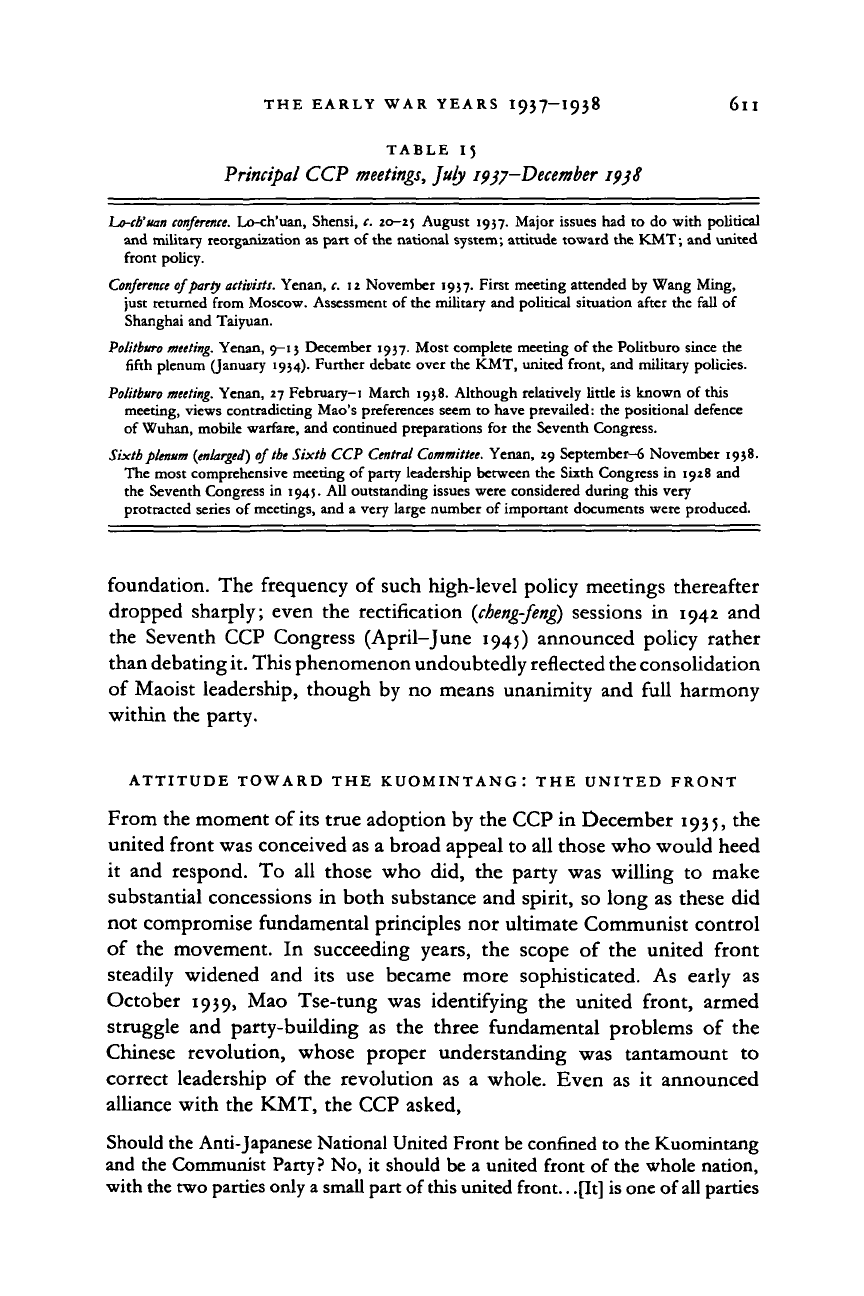
THE EARLY WAR YEARS 1957-1938 6ll
TABLE
15
Principal
CCP
meetings,
July i^jj-December ipjS
Lo-ch'uan
conference.
Lo-ch'uan, Shensi, c. 20-25 August 1937. Major issues
had to do
with political
and military reorganization
as
part
of
the national system; attitude toward
the
KMT;
and
united
front policy.
Conference
of party
activists.
Yenan,
c.
12
November 1937. First meeting attended
by
Wang Ming,
just returned from Moscow. Assessment
of
the military
and
political situation after
the
fall
of
Shanghai
and
Taiyuan.
Politburo
meeting.
Yenan, 9-13 December 1937. Most complete meeting
of
the Politburo since
the
fifth plenum (January 1934). Further debate over
the
KMT, united front,
and
military policies.
Politburo
meeting.
Yenan,
27
February-i March 1938. Although relatively little
is
known
of
this
meeting, views contradicting Mao's preferences seem
to
have prevailed:
the
positional defence
of Wuhan, mobile warfare,
and
continued preparations
for the
Seventh Congress.
Sixth
plenum {enlarged)
of
the
Sixth
CCP
Central
Committee.
Yenan,
29
September-6 November 1938.
The most comprehensive meeting
of
party leadership between
the
Sixth Congress
in
1928
and
the Seventh Congress
in
1945.
All
outstanding issues were considered during this very
protracted series
of
meetings,
and a
very large number
of
important documents were produced.
foundation.
The
frequency
of
such high-level policy meetings thereafter
dropped sharply; even
the
rectification
{cheng-feng)
sessions
in 1942 and
the Seventh
CCP
Congress (April-June
1945)
announced policy rather
than debating
it.
This phenomenon undoubtedly reflected the consolidation
of Maoist leadership, though
by no
means unanimity
and
full harmony
within
the
party.
ATTITUDE TOWARD THE KUOMINTANG: THE UNITED FRONT
From the moment
of
its true adoption
by
the CCP
in
December 1935,
the
united front was conceived as
a
broad appeal
to
all those who would heed
it
and
respond.
To all
those
who did, the
party
was
willing
to
make
substantial concessions
in
both substance
and
spirit,
so
long
as
these
did
not compromise fundamental principles
nor
ultimate Communist control
of
the
movement.
In
succeeding years,
the
scope
of the
united front
steadily widened
and its use
became more sophisticated.
As
early
as
October
1939, Mao
Tse-tung
was
identifying
the
united front, armed
struggle
and
party-building
as the
three fundamental problems
of the
Chinese revolution, whose proper understanding
was
tantamount
to
correct leadership
of the
revolution
as a
whole. Even
as it
announced
alliance with
the
KMT,
the
CCP asked,
Should the Anti-Japanese National United Front be confined to the Kuomintang
and the Communist Party? No,
it
should be
a
united front
of
the whole nation,
with the two parties only
a
small part of
this
united front..
.[It] is
one of all parties
Cambridge Histories Online © Cambridge University Press, 2008
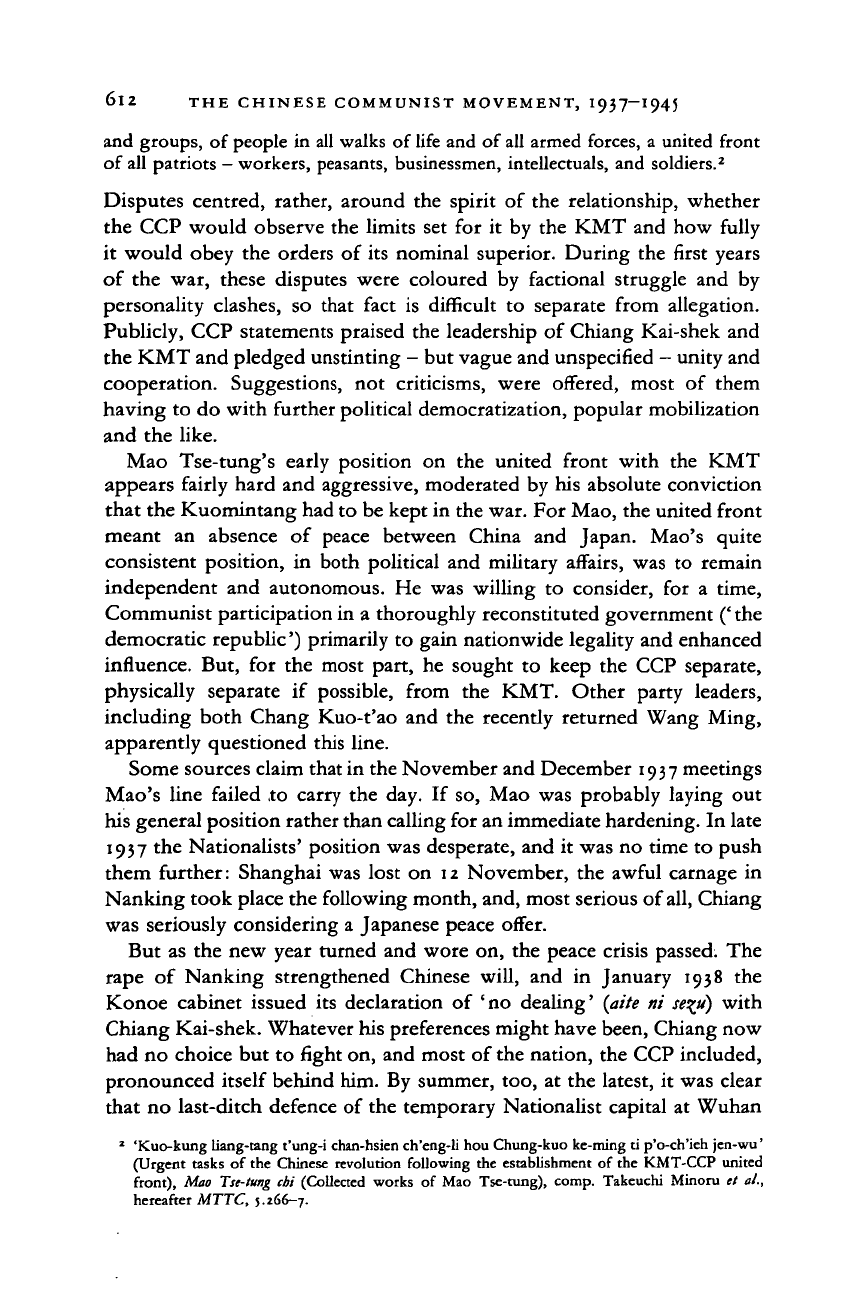
6l2 THE CHINESE COMMUNIST MOVEMENT, I937—1945
and groups, of people in all walks of life and of
all
armed forces, a united front
of all patriots
-
workers, peasants, businessmen, intellectuals, and soldiers.
2
Disputes centred, rather, around the spirit
of
the relationship, whether
the CCP would observe the limits set for
it
by the KMT and how fully
it would obey the orders
of
its nominal superior. During the first years
of the war, these disputes were coloured
by
factional struggle and
by
personality clashes,
so
that fact
is
difficult
to
separate from allegation.
Publicly, CCP statements praised the leadership
of
Chiang Kai-shek and
the KMT and pledged unstinting
-
but vague and unspecified
-
unity and
cooperation. Suggestions,
not
criticisms, were offered, most
of
them
having to do with further political democratization, popular mobilization
and the like.
Mao Tse-tung's early position
on the
united front with
the
KMT
appears fairly hard and aggressive, moderated by his absolute conviction
that the Kuomintang had to be kept in the war. For Mao, the united front
meant
an
absence
of
peace between China
and
Japan. Mao's quite
consistent position,
in
both political and military affairs, was
to
remain
independent and autonomous. He was willing
to
consider,
for a
time,
Communist participation in a thoroughly reconstituted government (' the
democratic republic') primarily to gain nationwide legality and enhanced
influence. But,
for
the most part,
he
sought
to
keep the CCP separate,
physically separate
if
possible, from
the
KMT. Other party leaders,
including both Chang Kuo-t'ao and the recently returned Wang Ming,
apparently questioned this line.
Some sources claim that in the November and December 1937 meetings
Mao's line failed
to
carry the day.
If
so, Mao was probably laying out
his general position rather than calling for an immediate hardening. In late
1937 the Nationalists' position was desperate, and
it
was no time to push
them further: Shanghai was lost on 12 November, the awful carnage
in
Nanking took place the following month, and, most serious of
all,
Chiang
was seriously considering a Japanese peace offer.
But as the new year turned and wore on, the peace crisis passed. The
rape
of
Nanking strengthened Chinese will,
and in
January 1938
the
Konoe cabinet issued its declaration
of
'no dealing' (aite ni
se^ti)
with
Chiang Kai-shek. Whatever his preferences might have been, Chiang now
had no choice but to fight on, and most of the nation, the CCP included,
pronounced itself behind him. By summer, too,
at
the latest,
it
was clear
that no last-ditch defence of the temporary Nationalist capital
at
Wuhan
2
'Kuo-kung liang-tang t'ung-i chan-hsien ch'eng-li hou Chung-kuo ke-ming ti p'o-ch'ieh jen-wu'
(Urgent tasks
of
the Chinese revolution following the establishment
of
the KMT-CCP united
front),
Mao
Tse-tung
cbi (Collected works
of
Mao Tse-tung), comp. Takeuchi Minoru
et
al.,
hereafter MTTC, 5.266-7.
Cambridge Histories Online © Cambridge University Press, 2008
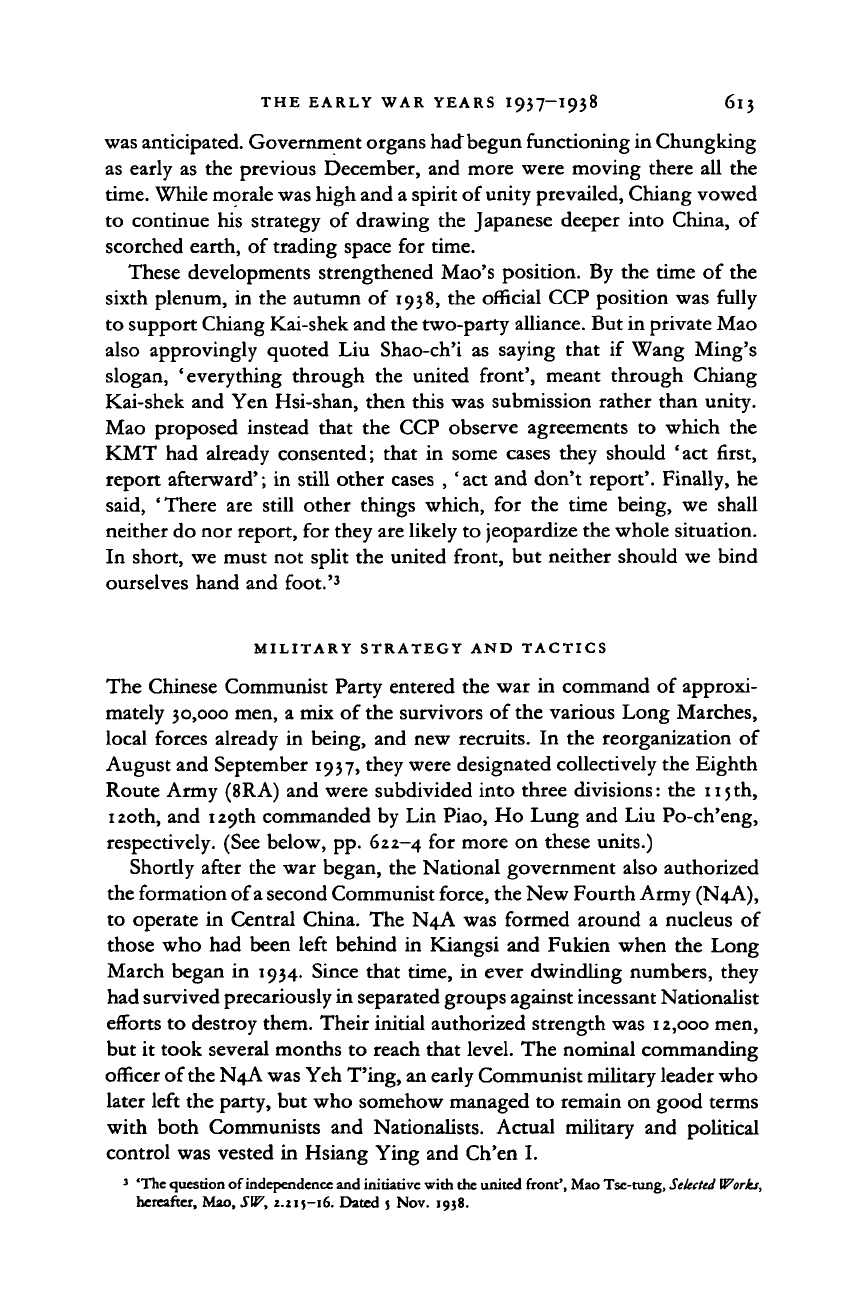
THE EARLY WAR YEARS I937-I938 613
was anticipated. Government organs had begun functioning in Chungking
as early
as the
previous December,
and
more were moving there
all the
time.
While morale was high and a spirit
of
unity prevailed, Chiang vowed
to continue
his
strategy
of
drawing
the
Japanese deeper into China,
of
scorched earth,
of
trading space
for
time.
These developments strengthened Mao's position.
By the
time
of
the
sixth plenum,
in the
autumn
of
1938,
the
official CCP position was fully
to support Chiang Kai-shek and the two-party alliance. But in private Mao
also approvingly quoted
Liu
Shao-ch'i
as
saying that
if
Wang Ming's
slogan, 'everything through
the
united front', meant through Chiang
Kai-shek
and
Yen Hsi-shan, then this was submission rather than unity.
Mao proposed instead that
the CCP
observe agreements
to
which
the
KMT
had
already consented; that
in
some cases they should
'act
first,
report afterward';
in
still other cases
,
' act
and
don't report'. Finally,
he
said, 'There
are
still other things which,
for the
time being,
we
shall
neither do nor report,
for
they are likely
to
jeopardize the whole situation.
In short,
we
must
not
split
the
united front,
but
neither should
we
bind
ourselves hand
and
foot.'
3
MILITARY STRATEGY AND TACTICS
The Chinese Communist Party entered
the war in
command
of
approxi-
mately 30,000 men,
a
mix
of
the survivors
of
the various Long Marches,
local forces already
in
being,
and new
recruits.
In the
reorganization
of
August and September 1937, they were designated collectively the Eighth
Route Army (8RA)
and
were subdivided into three divisions:
the
115th,
120th,
and
129th commanded
by Lin
Piao,
Ho
Lung
and Liu
Po-ch'eng,
respectively. (See below, pp. 622—4
f°
r
more
on
these units.)
Shortly after
the war
began,
the
National government also authorized
the formation of a second Communist force, the New Fourth Army (N4A),
to operate
in
Central China.
The N4A was
formed around
a
nucleus
of
those
who had
been left behind
in
Kiangsi
and
Fukien when
the
Long
March began
in
1934. Since that time,
in
ever dwindling numbers, they
had survived precariously in separated groups against incessant Nationalist
efforts
to
destroy them. Their initial authorized strength was 12,000 men,
but
it
took several months
to
reach that level. The nominal commanding
officer of the N4A was Yeh T'ing, an early Communist military leader who
later left the party,
but
who somehow managed
to
remain
on
good terms
with both Communists
and
Nationalists. Actual military
and
political
control was vested
in
Hsiang Ying
and
Ch'en
I.
3
'The question of independence and initiative with the united front', Mao Tse-tung,
Selected
Works,
hereafter, Mao, SW, 2.21}—16. Dated 5
Nov. 1938.
Cambridge Histories Online © Cambridge University Press, 2008
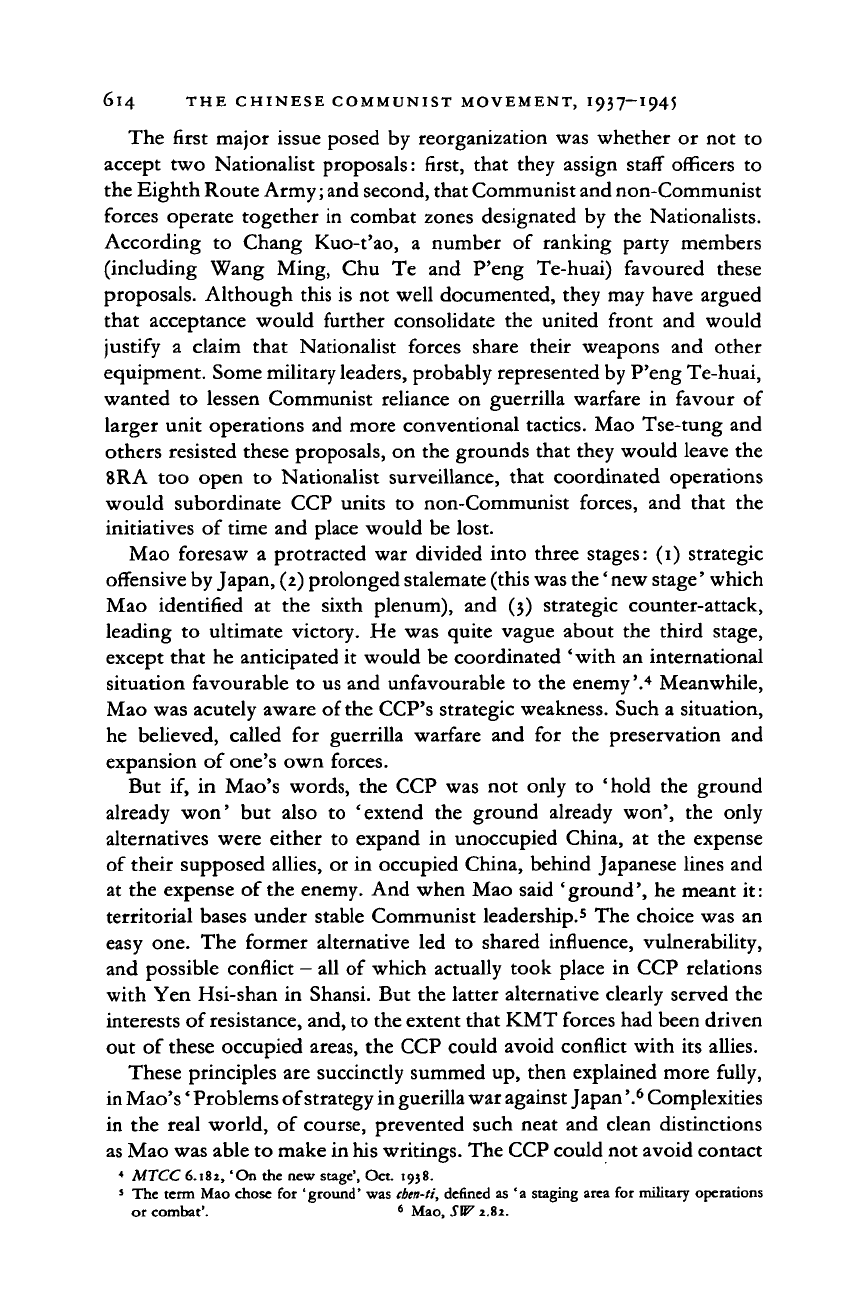
614 THE CHINESE COMMUNIST MOVEMENT, I937-I945
The first major issue posed
by
reorganization was whether
or
not
to
accept two Nationalist proposals: first, that they assign staff officers
to
the Eighth Route Army; and second, that Communist and non-Communist
forces operate together in combat zones designated by the Nationalists.
According
to
Chang Kuo-t'ao,
a
number
of
ranking party members
(including Wang Ming,
Chu Te and
P'eng Te-huai) favoured these
proposals. Although this is not well documented, they may have argued
that acceptance would further consolidate
the
united front
and
would
justify
a
claim that Nationalist forces share their weapons
and
other
equipment. Some military leaders, probably represented by P'eng Te-huai,
wanted
to
lessen Communist reliance
on
guerrilla warfare
in
favour
of
larger unit operations and more conventional tactics. Mao Tse-tung and
others resisted these proposals, on the grounds that they would leave the
8RA
too
open
to
Nationalist surveillance, that coordinated operations
would subordinate CCP units
to
non-Communist forces,
and
that
the
initiatives
of
time and place would be lost.
Mao foresaw
a
protracted war divided into three stages:
(i)
strategic
offensive by Japan, (2) prolonged stalemate (this was the' new stage' which
Mao identified
at the
sixth plenum),
and (3)
strategic counter-attack,
leading
to
ultimate victory. He was quite vague about the third stage,
except that he anticipated
it
would be coordinated ' with an international
situation favourable
to
us and unfavourable
to
the enemy'.
4
Meanwhile,
Mao was acutely aware of the CCP's strategic weakness. Such a situation,
he believed, called
for
guerrilla warfare
and for the
preservation
and
expansion
of
one's own forces.
But
if, in
Mao's words,
the
CCP was
not
only
to
'hold the ground
already won'
but
also
to
'extend
the
ground already won',
the
only
alternatives were either
to
expand
in
unoccupied China,
at
the expense
of their supposed allies, or in occupied China, behind Japanese lines and
at the expense of the enemy. And when Mao said 'ground', he meant
it:
territorial bases under stable Communist leadership.
5
The choice was
an
easy one. The former alternative
led to
shared influence, vulnerability,
and possible conflict
—
all
of
which actually took place
in
CCP relations
with Yen Hsi-shan
in
Shansi. But the latter alternative clearly served the
interests of
resistance,
and, to the extent that KMT forces had been driven
out
of
these occupied areas, the CCP could avoid conflict with its allies.
These principles are succinctly summed up, then explained more fully,
in
Mao's' Problems of strategy in guerilla war against Japan '.
6
Complexities
in the real world,
of
course, prevented such neat and clean distinctions
as Mao was able to make in his writings. The CCP could not avoid contact
4
MTCC 6.182, 'On the new stage', Oct. 1938.
s
The term Mao chose
for
'ground' was
cben-ti,
defined as
'a
staging area for military operations
or combat'.
6
Mao, SW 2.82.
Cambridge Histories Online © Cambridge University Press, 2008
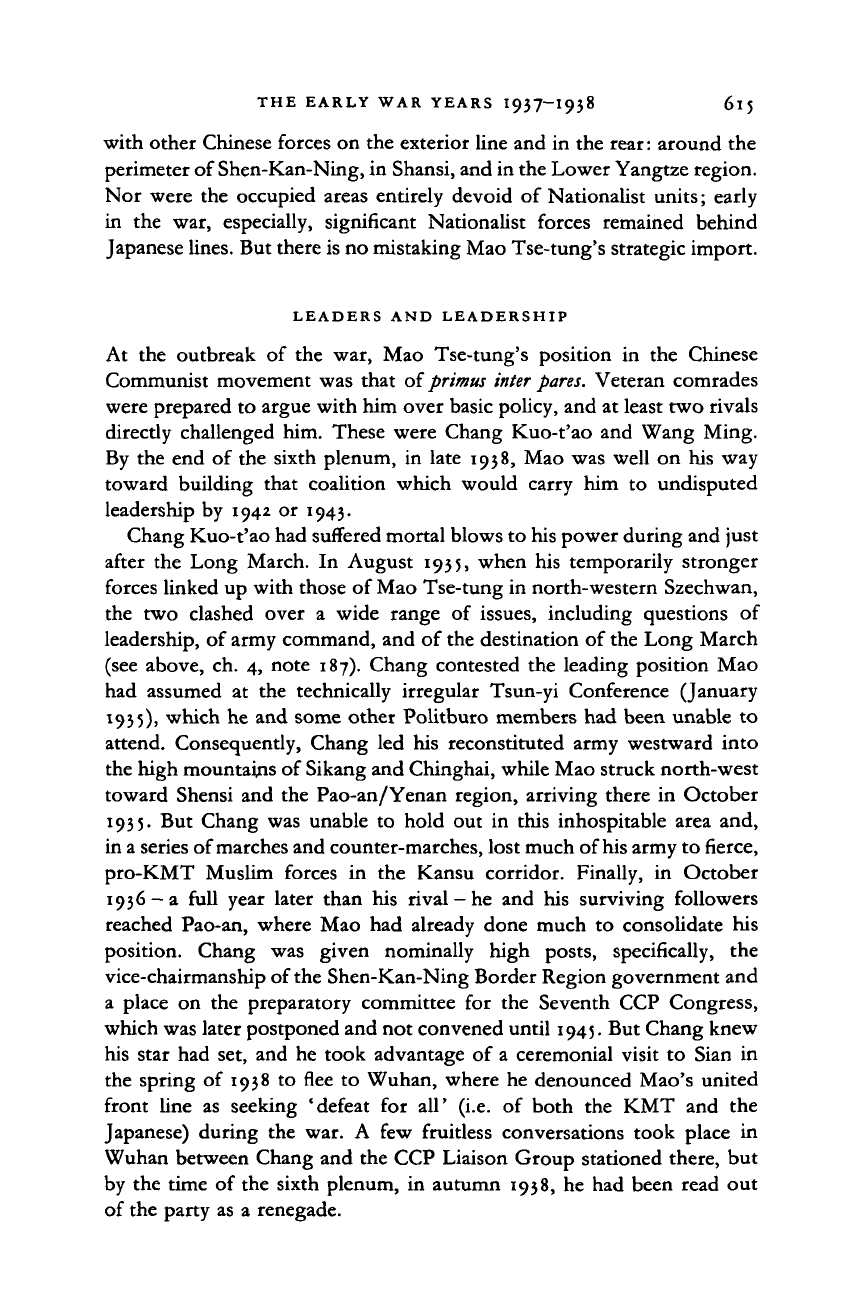
THE EARLY WAR YEARS I937—1938 615
with other Chinese forces on the exterior line and in the rear: around the
perimeter of Shen-Kan-Ning, in Shansi, and in the Lower Yangtze region.
Nor were the occupied areas entirely devoid of Nationalist units; early
in the war, especially, significant Nationalist forces remained behind
Japanese lines. But there is no mistaking Mao Tse-tung's strategic import.
LEADERS AND LEADERSHIP
At the outbreak of the war, Mao Tse-tung's position in the Chinese
Communist movement was that of primus
inter
pares.
Veteran comrades
were prepared to argue with him over basic policy, and at least two rivals
directly challenged him. These were Chang Kuo-t'ao and Wang Ming.
By the end of the sixth plenum, in late 1938, Mao was well on his way
toward building that coalition which would carry him to undisputed
leadership by 1942 or 1943.
Chang Kuo-t'ao had suffered mortal blows to his power during and just
after the Long March. In August 1935, when his temporarily stronger
forces linked up with those of Mao Tse-tung in north-western Szechwan,
the two clashed over a wide range of issues, including questions of
leadership, of army command, and of the destination of the Long March
(see above, ch. 4, note 187). Chang contested the leading position Mao
had assumed at the technically irregular Tsun-yi Conference (January
1935),
which he and some other Politburo members had been unable to
attend. Consequently, Chang led his reconstituted army westward into
the high mountains of Sikang and Chinghai, while Mao struck north-west
toward Shensi and the Pao-an/Yenan region, arriving there in October
1935.
But Chang was unable to hold out in this inhospitable area and,
in a series of marches and counter-marches, lost much of his army to fierce,
pro-KMT Muslim forces in the Kansu corridor. Finally, in October
1936-a full year later than his rival-he and his surviving followers
reached Pao-an, where Mao had already done much to consolidate his
position. Chang was given nominally high posts, specifically, the
vice-chairmanship of the Shen-Kan-Ning Border Region government and
a place on the preparatory committee for the Seventh CCP Congress,
which was later postponed and not convened until 1945. But Chang knew
his star had set, and he took advantage of a ceremonial visit to Sian in
the spring of 1938 to flee to Wuhan, where he denounced Mao's united
front line as seeking 'defeat for all' (i.e. of both the KMT and the
Japanese) during the war. A few fruitless conversations took place in
Wuhan between Chang and the CCP Liaison Group stationed there, but
by the time of the sixth plenum, in autumn 1938, he had been read out
of the party as a renegade.
Cambridge Histories Online © Cambridge University Press, 2008
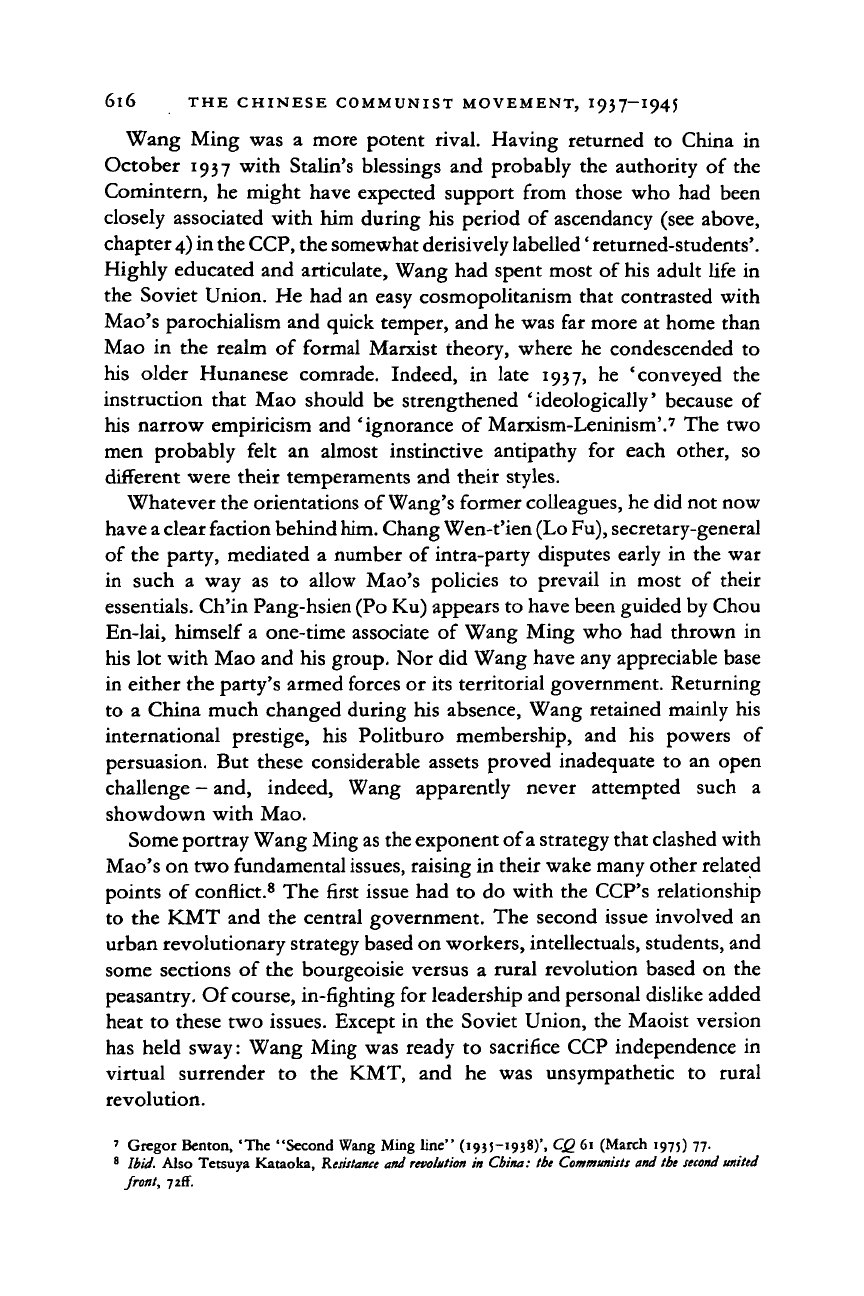
6l6 THE CHINESE COMMUNIST MOVEMENT,
Wang Ming was
a
more potent rival. Having returned
to
China
in
October 1937 with Stalin's blessings and probably the authority
of
the
Comintern,
he
might have expected support from those who had been
closely associated with him during his period of ascendancy (see above,
chapter
4)
in the
CCP,
the somewhat derisively labelled' returned-students'.
Highly educated and articulate, Wang had spent most of his adult life in
the Soviet Union. He had an easy cosmopolitanism that contrasted with
Mao's parochialism and quick temper, and he was far more at home than
Mao
in
the realm
of
formal Marxist theory, where he condescended
to
his older Hunanese comrade. Indeed,
in
late 1937,
he
'conveyed
the
instruction that Mao should be strengthened 'ideologically' because
of
his narrow empiricism and 'ignorance of Marxism-Leninism'.
7
The two
men probably felt
an
almost instinctive antipathy
for
each other,
so
different were their temperaments and their styles.
Whatever the orientations of Wang's former colleagues, he did not now
have
a
clear faction behind
him.
Chang Wen-t'ien (Lo
Fu),
secretary-general
of the party, mediated
a
number of intra-party disputes early in the war
in such
a
way
as to
allow Mao's policies
to
prevail
in
most
of
their
essentials. Ch'in Pang-hsien (Po Ku) appears to have been guided by Chou
En-lai, himself a one-time associate
of
Wang Ming who had thrown
in
his lot with Mao and his group. Nor did Wang have any appreciable base
in either the party's armed forces or its territorial government. Returning
to
a
China much changed during his absence, Wang retained mainly his
international prestige,
his
Politburo membership,
and his
powers
of
persuasion. But these considerable assets proved inadequate
to
an open
challenge
-
and, indeed, Wang apparently never attempted such
a
showdown with Mao.
Some portray Wang Ming as the exponent of a strategy that clashed with
Mao's on two fundamental
issues,
raising in their wake many other related
points of conflict.
8
The first issue had
to
do with the CCP's relationship
to the KMT and the central government. The second issue involved an
urban revolutionary strategy based on workers, intellectuals, students, and
some sections of the bourgeoisie versus
a
rural revolution based on the
peasantry. Of course, in-fighting for leadership and personal dislike added
heat to these two issues. Except in the Soviet Union, the Maoist version
has held sway: Wang Ming was ready
to
sacrifice CCP independence
in
virtual surrender
to the
KMT,
and he was
unsympathetic
to
rural
revolution.
7
Gregor Benton, 'The "Second Wang Ming line" (1935-1938)', CQ 61 (March 1975) 77.
8
Ibid.
Also Tetsuya Kataoka,
Resistance
and
revolution
in
China:
the
Communists and the
second united
front,
-jiff.
Cambridge Histories Online © Cambridge University Press, 2008
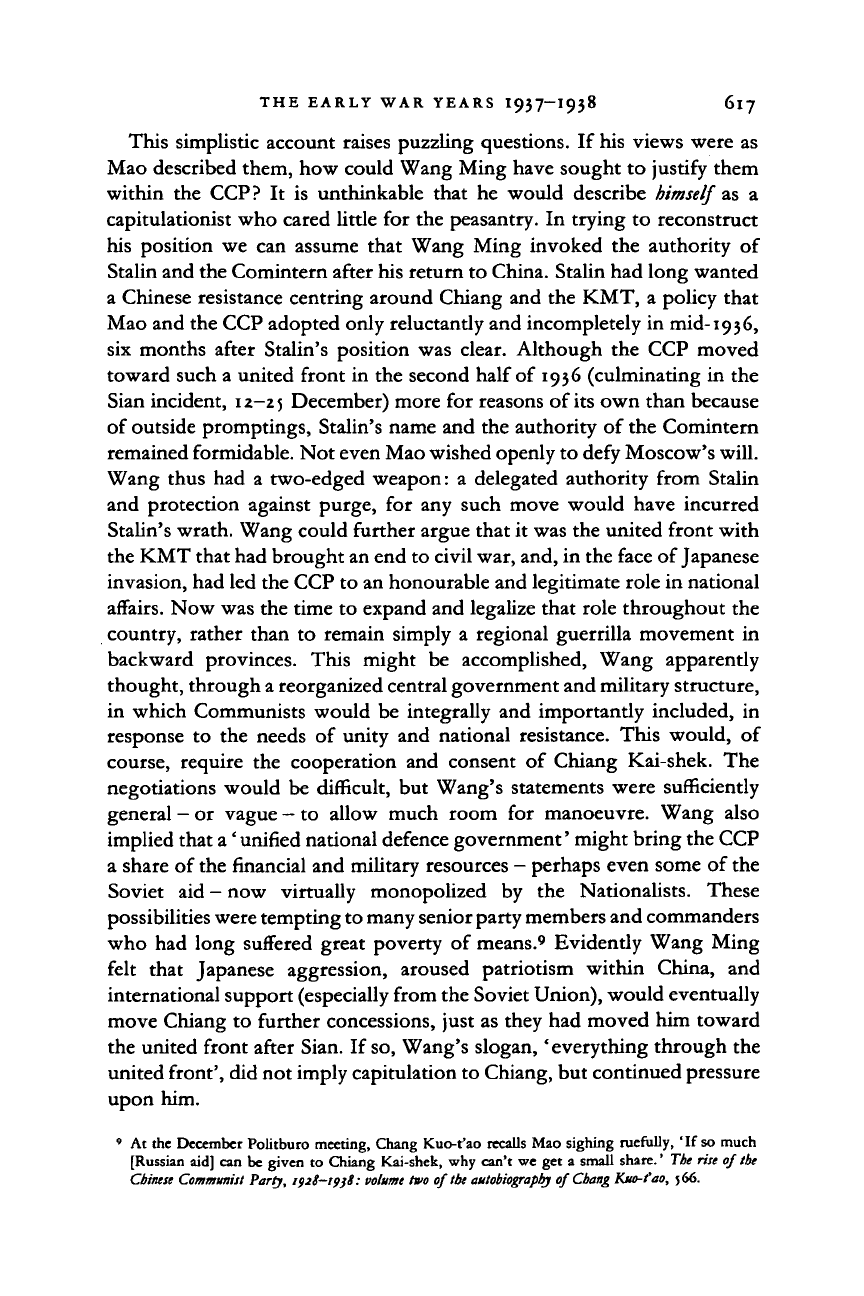
THE EARLY WAR YEARS I937—1938 617
This simplistic account raises puzzling questions. If his views were as
Mao described them, how could Wang Ming have sought to justify them
within the CCP? It is unthinkable that he would describe himself as a
capitulationist who cared little for the peasantry. In trying to reconstruct
his position we can assume that Wang Ming invoked the authority of
Stalin and the Comintern after his return to China. Stalin had long wanted
a Chinese resistance centring around Chiang and the KMT, a policy that
Mao and the CCP adopted only reluctantly and incompletely in mid-1936,
six months after Stalin's position was clear. Although the CCP moved
toward such a united front in the second half of 1936 (culminating in the
Sian incident, 12-25 December) more for reasons of its own than because
of outside promptings, Stalin's name and the authority of the Comintern
remained formidable. Not even Mao wished openly to defy Moscow's will.
Wang thus had a two-edged weapon: a delegated authority from Stalin
and protection against purge, for any such move would have incurred
Stalin's wrath. Wang could further argue that it was the united front with
the KMT that had brought an end to civil war, and, in the face of Japanese
invasion, had led the CCP to an honourable and legitimate role in national
affairs. Now was the time to expand and legalize that role throughout the
country, rather than to remain simply a regional guerrilla movement in
backward provinces. This might be accomplished, Wang apparently
thought, through a reorganized central government and military structure,
in which Communists would be integrally and importantly included, in
response to the needs of unity and national resistance. This would, of
course, require the cooperation and consent of Chiang Kai-shek. The
negotiations would be difficult, but Wang's statements were sufficiently
general - or vague - to allow much room for manoeuvre. Wang also
implied that a' unified national defence government' might bring the CCP
a share of the financial and military resources - perhaps even some of the
Soviet aid - now virtually monopolized by the Nationalists. These
possibilities were tempting to many senior party members and commanders
who had long suffered great poverty of means.
9
Evidently Wang Ming
felt that Japanese aggression, aroused patriotism within China, and
international support (especially from the Soviet Union), would eventually
move Chiang to further concessions, just as they had moved him toward
the united front after Sian. If
so,
Wang's slogan,' everything through the
united front', did not imply capitulation to Chiang, but continued pressure
upon him.
0
At the December Politburo meeting, Chang Kuo-t'ao recalls Mao sighing ruefully,
'
If so much
[Russian aid] can be given to Chiang Kai-shek, why can't we get a small share.' The
rise
of
the
Chinese Communist Party, ifiS—if)!:
volume
two of
the autobiography
of
Chang
Kuo-fao, 566.
Cambridge Histories Online © Cambridge University Press, 2008
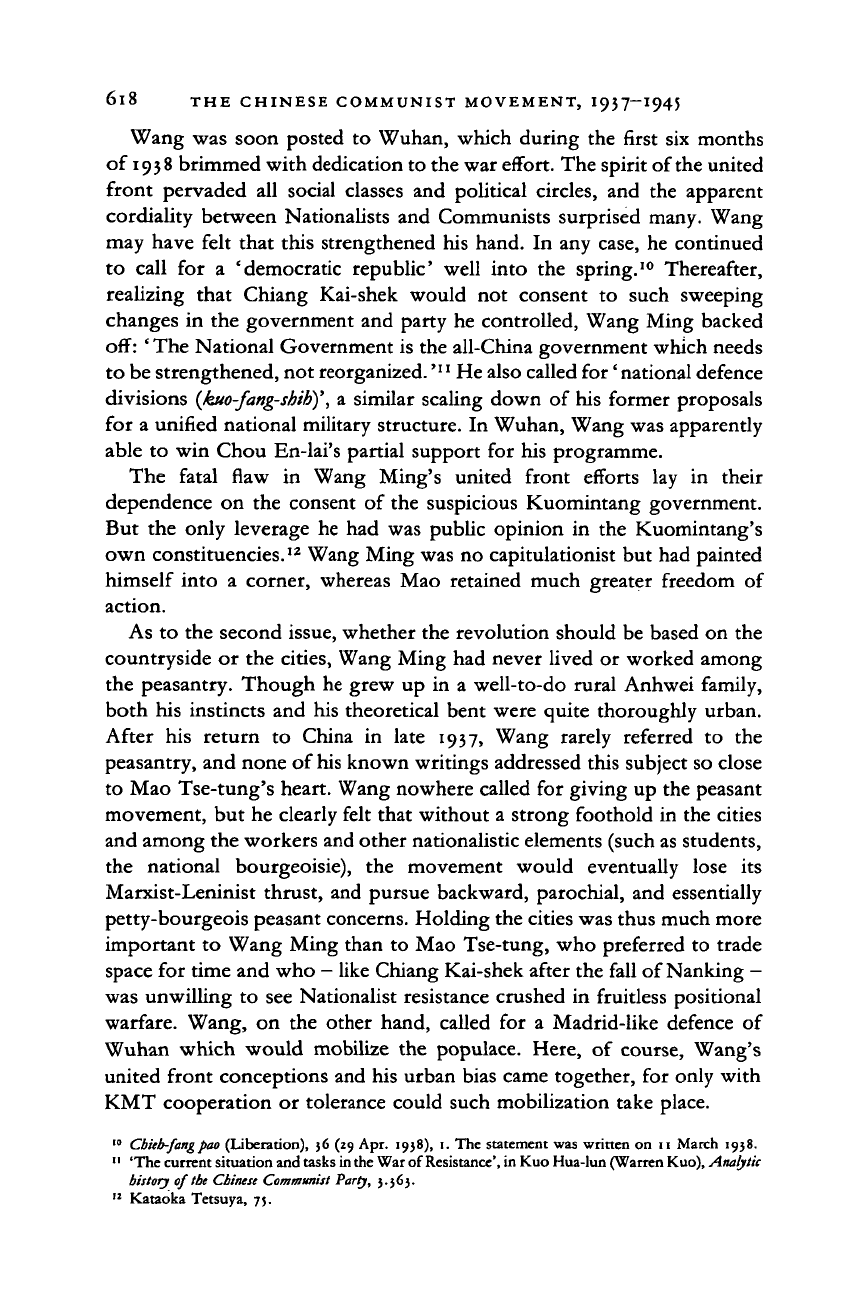
6l8 THE CHINESE COMMUNIST MOVEMENT, I937-I945
Wang was soon posted
to
Wuhan, which during the first six months
of 1938 brimmed with dedication to the war effort. The spirit of
the
united
front pervaded
all
social classes and political circles,
and the
apparent
cordiality between Nationalists and Communists surprised many. Wang
may have felt that this strengthened his hand.
In
any case, he continued
to call
for a
'democratic republic' well into
the
spring.
10
Thereafter,
realizing that Chiang Kai-shek would
not
consent
to
such sweeping
changes
in
the government and party he controlled, Wang Ming backed
off: ' The National Government is the all-China government which needs
to be strengthened, not reorganized.'" He also called for 'national defence
divisions
(kuo-fang-shih)'',
a
similar scaling down
of
his former proposals
for
a
unified national military structure. In Wuhan, Wang was apparently
able
to
win Chou En-lai's partial support for his programme.
The fatal flaw
in
Wang Ming's united front efforts
lay in
their
dependence
on
the consent
of
the suspicious Kuomintang government.
But the only leverage he had was public opinion
in the
Kuomintang's
own constituencies.
12
Wang Ming was no capitulationist but had painted
himself into
a
corner, whereas Mao retained much greater freedom
of
action.
As
to
the second issue, whether the revolution should be based on the
countryside
or
the cities, Wang Ming had never lived
or
worked among
the peasantry. Though he grew up
in a
well-to-do rural Anhwei family,
both his instincts and his theoretical bent were quite thoroughly urban.
After
his
return
to
China
in
late 1937, Wang rarely referred
to the
peasantry, and none of
his
known writings addressed this subject so close
to Mao Tse-tung's heart. Wang nowhere called for giving up the peasant
movement, but he clearly felt that without a strong foothold in the cities
and among the workers and other nationalistic elements (such as students,
the national bourgeoisie),
the
movement would eventually lose
its
Marxist-Leninist thrust, and pursue backward, parochial, and essentially
petty-bourgeois peasant concerns. Holding the cities was thus much more
important to Wang Ming than to Mao Tse-tung, who preferred to trade
space for time and who
-
like Chiang Kai-shek after the fall of Nanking
-
was unwilling
to
see Nationalist resistance crushed in fruitless positional
warfare. Wang,
on
the other hand, called
for a
Madrid-like defence
of
Wuhan which would mobilize
the
populace. Here,
of
course, Wang's
united front conceptions and his urban bias came together, for only with
KMT cooperation
or
tolerance could such mobilization take place.
10
Cbieh-fangpoo
(Liberation), 36 (29 Apr. 1958), 1. The statement was written on 11 March 1938.
11
"The current situation and tasks
in
the
War
of Resistance', in Kuo Hua-lun (Warren Kuo),
Analytic
history of
the
Chinese Communist Party, 3.363.
12
Kataoka Tetsuya,
75.
Cambridge Histories Online © Cambridge University Press, 2008
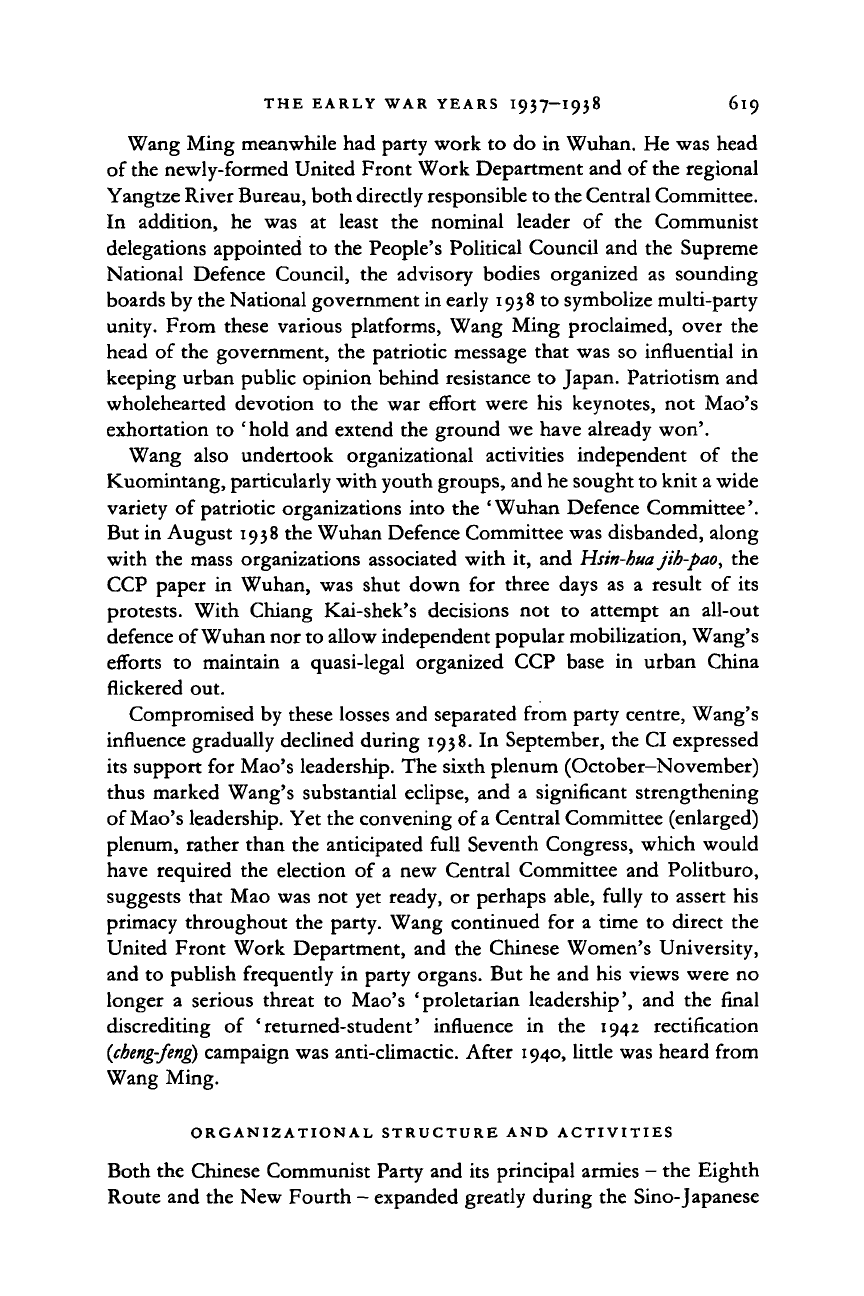
THE EARLY WAR YEARS I937-I938 619
Wang Ming meanwhile had party work to do in Wuhan. He was head
of the newly-formed United Front Work Department and of the regional
Yangtze River Bureau, both directly responsible to the Central Committee.
In addition, he was at least the nominal leader of the Communist
delegations appointed to the People's Political Council and the Supreme
National Defence Council, the advisory bodies organized as sounding
boards by the National government in early 1938 to symbolize multi-party
unity. From these various platforms, Wang Ming proclaimed, over the
head of the government, the patriotic message that was so influential in
keeping urban public opinion behind resistance to Japan. Patriotism and
wholehearted devotion to the war effort were his keynotes, not Mao's
exhortation to 'hold and extend the ground we have already won'.
Wang also undertook organizational activities independent of the
Kuomintang, particularly with youth groups, and he sought to knit a wide
variety of patriotic organizations into the 'Wuhan Defence Committee'.
But in August 1938 the Wuhan Defence Committee was disbanded, along
with the mass organizations associated with it, and Hsin-hua jih-pao, the
CCP paper in Wuhan, was shut down for three days as a result of its
protests. With Chiang Kai-shek's decisions not to attempt an all-out
defence of Wuhan nor to allow independent popular mobilization, Wang's
efforts to maintain a quasi-legal organized CCP base in urban China
flickered out.
Compromised by these losses and separated from party centre, Wang's
influence gradually declined during 1938. In September, the CI expressed
its support for Mao's leadership. The sixth plenum (October-November)
thus marked Wang's substantial eclipse, and a significant strengthening
of Mao's leadership. Yet the convening of a Central Committee (enlarged)
plenum, rather than the anticipated full Seventh Congress, which would
have required the election of a new Central Committee and Politburo,
suggests that Mao was not yet ready, or perhaps able, fully to assert his
primacy throughout the party. Wang continued for a time to direct the
United Front Work Department, and the Chinese Women's University,
and to publish frequently in party organs. But he and his views were no
longer a serious threat to Mao's 'proletarian leadership', and the final
discrediting of 'returned-student' influence in the 1942 rectification
(cheng-feng)
campaign was anti-climactic. After 1940, little was heard from
Wang Ming.
ORGANIZATIONAL STRUCTURE AND ACTIVITIES
Both the Chinese Communist Party and its principal armies - the Eighth
Route and the New Fourth - expanded greatly during the Sino-Japanese
Cambridge Histories Online © Cambridge University Press, 2008
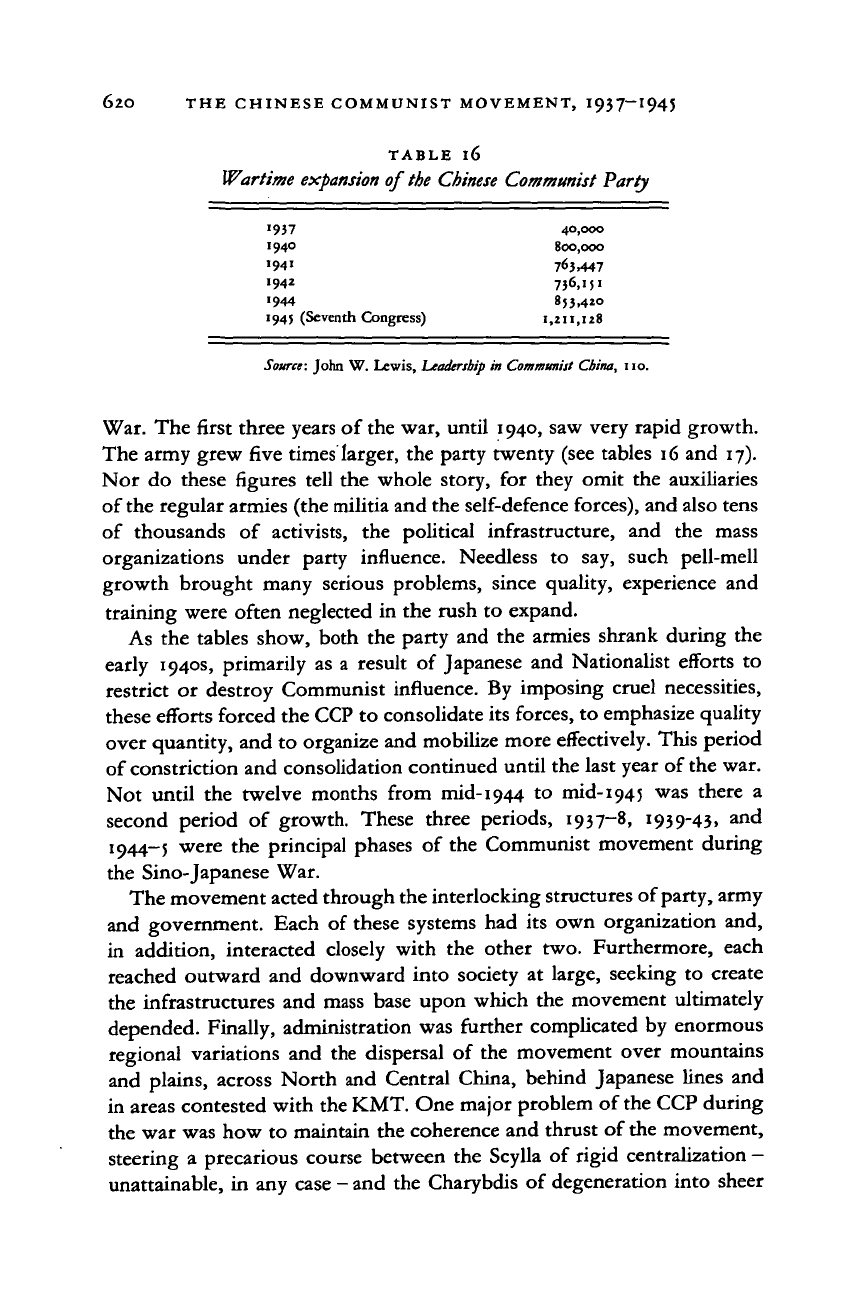
62O
THE
CHINESE COMMUNIST MOVEMENT, I937-I945
TABLE
l6
Wartime expansion
of
the Chinese
Communist Party
'937
1940
1941
1942
'944
1945 (Seventh Congress)
40,000
800,000
763>447
736.'5'
853.4*0
1,211,128
Source: John
W.
Lewis, Leadership
in
Communist China,
110.
War.
The
first three years
of
the war, until 1940,
saw
very rapid growth.
The army grew five times larger,
the
party twenty
(see
tables 16
and 17).
Nor
do
these figures tell
the
whole story,
for
they omit
the
auxiliaries
of the regular armies (the militia and the self-defence forces), and also tens
of thousands
of
activists,
the
political infrastructure,
and the
mass
organizations under party influence. Needless
to say,
such pell-mell
growth brought many serious problems, since quality, experience
and
training were often neglected
in the
rush
to
expand.
As
the
tables show, both
the
party
and the
armies shrank during
the
early 1940s, primarily
as a
result
of
Japanese
and
Nationalist efforts
to
restrict
or
destroy Communist influence.
By
imposing cruel necessities,
these efforts forced
the
CCP
to
consolidate its forces,
to
emphasize quality
over quantity,
and to
organize
and
mobilize more effectively. This period
of constriction
and
consolidation continued until
the
last year
of
the
war.
Not until
the
twelve months from mid-1944
to
mid-194 5
was
there
a
second period
of
growth. These three periods, 1937-8, 1939-43,
and
1944-5 were
the
principal phases
of the
Communist movement during
the Sino-Japanese
War.
The movement acted through the interlocking structures of party, army
and government. Each
of
these systems
had its own
organization
and,
in addition, interacted closely with
the
other
two.
Furthermore, each
reached outward
and
downward into society
at
large, seeking
to
create
the infrastructures
and
mass base upon which
the
movement ultimately
depended. Finally, administration
was
further complicated
by
enormous
regional variations
and the
dispersal
of the
movement over mountains
and plains, across North
and
Central China, behind Japanese lines
and
in areas contested with the KMT.
One
major problem
of
the CCP during
the
war
was
how to
maintain
the
coherence
and
thrust
of
the movement,
steering
a
precarious course between
the
Scylla
of
rigid centralization
-
unattainable,
in any
case
-
and
the
Charybdis
of
degeneration into sheer
Cambridge Histories Online © Cambridge University Press, 2008
